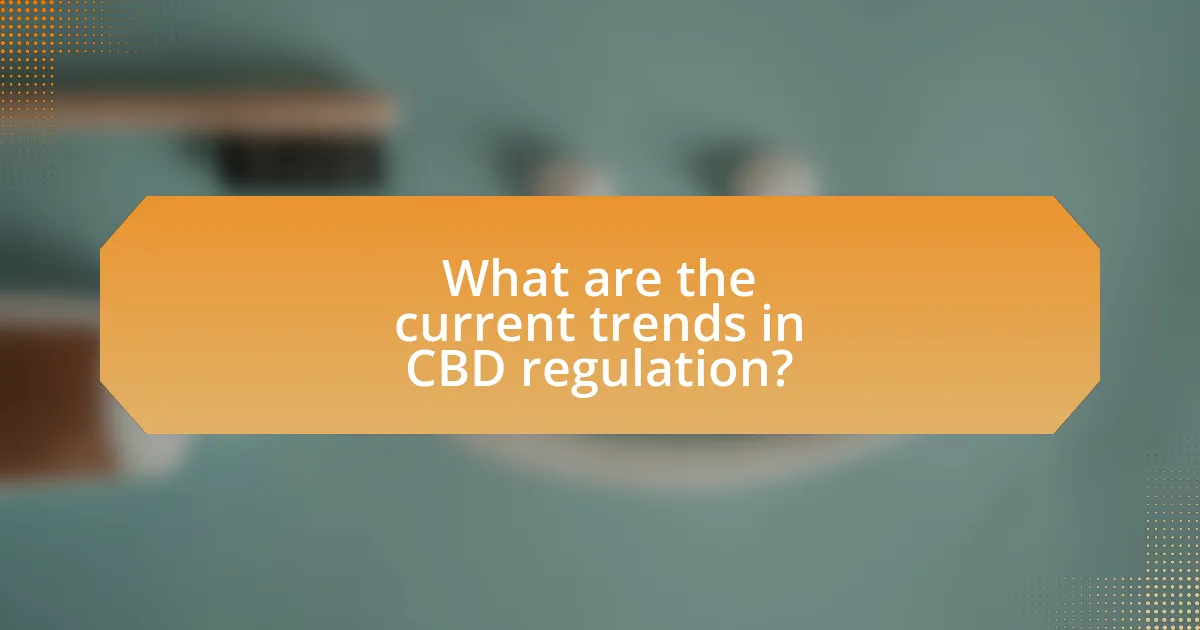The article focuses on the current trends and innovations in CBD regulation, highlighting the increasing state-level legalization, clearer labeling standards, and the establishment of federal oversight. It discusses the impact of recent legal changes, such as the 2018 Farm Bill, on the CBD market, and outlines specific regulations introduced in the past year, including FDA guidelines and state-level testing requirements. The article also examines the challenges regulators face, consumer safety concerns, and the role of technology, such as blockchain and data analytics, in enhancing compliance and product quality. Additionally, it explores proposed regulatory frameworks and how consumer demand and public perceptions are shaping the future of CBD regulation.

What are the current trends in CBD regulation?
Current trends in CBD regulation include increased state-level legalization, the establishment of clearer labeling and quality standards, and ongoing discussions regarding federal oversight. As of 2023, over 40 states have legalized CBD products, reflecting a growing acceptance and demand. Additionally, organizations like the FDA are working towards creating guidelines for product safety and marketing claims, which aim to protect consumers and ensure product integrity. These trends indicate a shift towards more structured regulation, promoting both consumer safety and industry growth.
How have recent legal changes impacted the CBD market?
Recent legal changes have significantly expanded the CBD market by clarifying regulations and increasing consumer access. For instance, the 2018 Farm Bill legalized hemp-derived CBD at the federal level in the United States, which led to a surge in product availability and market growth, with the CBD market projected to reach $20 billion by 2024 according to Brightfield Group. Additionally, states have implemented their own regulations, further legitimizing CBD products and fostering a competitive landscape that encourages innovation and investment in the sector.
What specific regulations have been introduced in the last year?
In the last year, several specific regulations have been introduced concerning CBD, including the FDA’s proposed guidelines for the marketing of CBD products and the establishment of state-level regulations in various jurisdictions. The FDA’s guidelines aim to clarify the legal status of CBD in food and dietary supplements, emphasizing safety and labeling requirements. Additionally, states like California and Colorado have implemented regulations that require testing for potency and contaminants in CBD products, ensuring consumer safety and product quality. These developments reflect a growing effort to standardize CBD regulations and enhance consumer protection in the rapidly evolving market.
How do these regulations vary by region or country?
Regulations regarding CBD vary significantly by region and country, reflecting differing legal frameworks and cultural attitudes towards cannabis. For instance, in the United States, the 2018 Farm Bill legalized hemp-derived CBD at the federal level, but individual states have the authority to impose their own regulations, leading to a patchwork of laws. In contrast, the European Union allows CBD products derived from hemp with less than 0.2% THC, but member states can have additional restrictions, such as France’s ban on CBD flowers. Meanwhile, countries like Canada have fully legalized cannabis, including CBD, under the Cannabis Act, which regulates its production, distribution, and sale. These variations illustrate how local laws, public health policies, and societal norms shape the regulatory landscape for CBD across different jurisdictions.
What challenges do regulators face in the CBD industry?
Regulators face significant challenges in the CBD industry, primarily due to the lack of standardized regulations and varying state laws. The absence of a cohesive federal framework creates confusion for both consumers and businesses, leading to inconsistent product quality and safety standards. For instance, the FDA has not yet established comprehensive guidelines for CBD products, which complicates enforcement and compliance efforts. Additionally, the rapid growth of the market outpaces regulatory developments, making it difficult for regulators to keep up with emerging products and claims. This situation is further complicated by the ongoing debate regarding the legal status of hemp-derived CBD versus marijuana-derived CBD, which varies by jurisdiction.
What are the main concerns regarding consumer safety?
The main concerns regarding consumer safety in the context of CBD regulation include product quality, accurate labeling, and potential health risks. Product quality is critical as many CBD products may contain contaminants or not meet the claimed potency, leading to ineffective or harmful consumption. Accurate labeling is essential to ensure consumers are informed about the contents and dosage of CBD products, as discrepancies can result in misuse or adverse effects. Additionally, potential health risks arise from the lack of comprehensive research on CBD’s long-term effects, which raises concerns about its safety, especially for vulnerable populations such as children and pregnant women. These concerns are supported by findings from the FDA, which has reported instances of mislabeling and contamination in CBD products, highlighting the need for stricter regulatory oversight to protect consumers.
How do regulatory bodies address issues of product quality?
Regulatory bodies address issues of product quality by establishing and enforcing standards that manufacturers must meet to ensure safety and efficacy. These standards often include guidelines for testing, labeling, and manufacturing practices. For instance, the U.S. Food and Drug Administration (FDA) requires that dietary supplements, including CBD products, adhere to Good Manufacturing Practices (GMP) to minimize risks of contamination and ensure consistency in product formulation. Additionally, regulatory bodies may conduct inspections and audits to verify compliance with these standards, and they can impose penalties or recalls for products that fail to meet quality requirements. This systematic approach helps maintain consumer trust and safety in the marketplace.

What innovations are emerging in CBD regulation?
Innovations in CBD regulation include the development of standardized testing methods, clearer labeling requirements, and the establishment of regulatory frameworks that differentiate between hemp-derived and marijuana-derived CBD. These advancements aim to enhance consumer safety and product transparency. For instance, the U.S. Food and Drug Administration (FDA) is actively working on guidelines that would require manufacturers to provide detailed information about the potency and purity of CBD products, which addresses concerns about product consistency and quality. Additionally, states like Colorado and California are implementing stricter regulations that mandate third-party testing for CBD products, ensuring that they meet safety standards and contain the advertised levels of cannabinoids.
How is technology influencing CBD regulatory practices?
Technology is significantly influencing CBD regulatory practices by enabling more precise tracking and testing of products. Advanced technologies such as blockchain provide transparent supply chain management, ensuring that CBD products are sourced and processed according to regulatory standards. Additionally, innovations in analytical testing methods, like high-performance liquid chromatography (HPLC), allow for accurate measurement of cannabinoid content and contaminants, which is essential for compliance with safety regulations. These technological advancements not only enhance product safety but also facilitate regulatory bodies in monitoring compliance effectively, thereby fostering a more trustworthy market environment for consumers.
What role do blockchain and traceability play in CBD regulation?
Blockchain and traceability enhance CBD regulation by providing a transparent and immutable record of the product’s journey from cultivation to sale. This technology allows regulators and consumers to verify the authenticity and quality of CBD products, ensuring compliance with legal standards. For instance, blockchain can track the source of hemp, document processing methods, and confirm testing results, thereby reducing the risk of contamination and fraud. The use of blockchain in the CBD industry has been supported by studies indicating that traceability can significantly improve product safety and consumer trust, as seen in the 2020 report by the World Economic Forum, which highlights the potential of blockchain to revolutionize supply chain transparency across various sectors.
How are data analytics being used to improve compliance?
Data analytics are being used to improve compliance by enabling organizations to monitor regulatory adherence in real-time and identify potential risks proactively. By analyzing large datasets, companies can track compliance metrics, detect anomalies, and ensure that operations align with legal requirements. For instance, businesses in the CBD industry utilize data analytics to assess product quality, verify labeling accuracy, and ensure that marketing practices comply with regulations. This approach not only enhances transparency but also reduces the likelihood of regulatory violations, as evidenced by a report from the International Compliance Association, which highlights that organizations employing data analytics saw a 30% reduction in compliance-related incidents over a two-year period.
What new regulatory frameworks are being proposed?
New regulatory frameworks being proposed for CBD include the establishment of a comprehensive federal regulatory system that would oversee the production, distribution, and marketing of CBD products. This framework aims to ensure product safety, labeling accuracy, and consumer protection, addressing the current lack of uniform regulations across states. The proposed regulations are informed by the 2018 Farm Bill, which legalized hemp-derived CBD, and ongoing discussions among federal agencies, including the FDA, regarding the need for clear guidelines on dosage, health claims, and quality standards.
What are the key features of these proposed frameworks?
The key features of the proposed frameworks for CBD regulation include standardized testing protocols, clear labeling requirements, and comprehensive safety assessments. Standardized testing protocols ensure consistency in product quality and potency, which is crucial for consumer safety and trust. Clear labeling requirements mandate that products disclose their ingredients, cannabinoid content, and any potential allergens, enabling informed consumer choices. Comprehensive safety assessments involve rigorous evaluation of the health effects of CBD products, ensuring they meet safety standards before reaching the market. These features collectively aim to enhance consumer protection and promote responsible industry practices.
How might these frameworks affect the future of the CBD market?
Regulatory frameworks will significantly shape the future of the CBD market by establishing clear guidelines for production, marketing, and distribution. These frameworks can enhance consumer safety and product quality, as seen in states that have implemented strict testing and labeling requirements, leading to increased consumer trust. For instance, a study by the Hemp Industries Association reported that states with robust regulations saw a 20% increase in CBD sales compared to those without. Furthermore, comprehensive regulations can facilitate market entry for legitimate businesses while deterring illicit operations, thereby fostering a more sustainable and competitive market landscape.

What can we expect in the future of CBD regulation?
In the future of CBD regulation, we can expect increased clarity and standardization across various jurisdictions. As the market for CBD products continues to grow, regulatory bodies are likely to implement more comprehensive guidelines to ensure product safety, labeling accuracy, and consumer protection. For instance, the U.S. Food and Drug Administration (FDA) has been actively working on establishing a regulatory framework for CBD, which includes evaluating the safety of CBD in food and dietary supplements. This effort is supported by the growing body of research indicating both the therapeutic potential and safety concerns associated with CBD use. Additionally, states may adopt more uniform regulations to facilitate interstate commerce and reduce confusion among consumers and businesses.
How might consumer demand shape future regulations?
Consumer demand will significantly shape future regulations by prompting lawmakers to respond to evolving market preferences and safety concerns. As consumers increasingly seek transparency, quality, and safety in CBD products, regulatory bodies may implement stricter labeling requirements and quality control standards to ensure product integrity. For instance, a 2021 survey by the Hemp Industry Association indicated that 73% of consumers prioritize product safety and quality, suggesting that regulatory frameworks will likely adapt to meet these expectations. Consequently, as consumer preferences shift towards more sustainable and ethically sourced products, regulations may evolve to include guidelines on sourcing and environmental impact, reflecting the growing demand for responsible consumption.
What trends in consumer preferences are influencing regulatory changes?
Trends in consumer preferences influencing regulatory changes include a growing demand for transparency, safety, and sustainability in CBD products. Consumers increasingly seek products that are third-party tested for quality and potency, prompting regulators to establish stricter testing and labeling requirements. Additionally, the rise in popularity of organic and ethically sourced ingredients has led to calls for regulations that ensure environmentally friendly practices in CBD production. These shifts reflect a broader consumer movement towards health-conscious and environmentally responsible choices, which regulators are responding to by implementing more comprehensive guidelines and standards in the CBD industry.
How do public perceptions of CBD affect regulatory approaches?
Public perceptions of CBD significantly influence regulatory approaches by shaping policymakers’ decisions and public health strategies. When the general public views CBD positively, often associating it with health benefits and safety, regulators are more likely to adopt lenient policies that facilitate research, commercialization, and accessibility. For instance, a survey conducted by the Hemp Business Journal in 2020 indicated that 60% of Americans support the legalization of CBD, prompting states to create more favorable regulations. Conversely, negative perceptions, often fueled by misinformation or concerns about safety, can lead to stricter regulations and limitations on CBD products. This dynamic illustrates how public sentiment directly impacts the regulatory landscape surrounding CBD, as seen in varying state laws across the U.S. that reflect local attitudes toward cannabis-derived products.
What best practices can businesses adopt to navigate future regulations?
Businesses can adopt proactive compliance strategies to navigate future regulations effectively. This includes staying informed about regulatory changes through continuous monitoring of industry news and government announcements, which allows businesses to anticipate and adapt to new requirements. Additionally, implementing robust compliance programs that include regular training for employees ensures that all staff are aware of current regulations and best practices. Engaging with industry associations can provide valuable insights and resources, fostering collaboration and advocacy for favorable regulatory conditions. Furthermore, investing in legal counsel specializing in regulatory affairs can help businesses interpret complex regulations and develop strategies to remain compliant. These practices are essential as the CBD industry faces evolving regulations, with the potential for significant legal implications for non-compliance.
How can companies stay informed about regulatory changes?
Companies can stay informed about regulatory changes by subscribing to industry newsletters, attending relevant conferences, and engaging with regulatory bodies. These methods provide timely updates and insights into evolving regulations. For instance, organizations like the National Cannabis Industry Association offer resources and updates specifically related to cannabis regulations, which can be crucial for companies in the CBD sector. Additionally, monitoring government websites and utilizing compliance software can further enhance awareness of regulatory shifts.
What strategies can businesses implement to ensure compliance?
Businesses can implement several strategies to ensure compliance with CBD regulations, including establishing a robust compliance program, conducting regular training for employees, and engaging legal experts. A robust compliance program involves creating clear policies and procedures that align with current regulations, which helps mitigate risks associated with non-compliance. Regular training ensures that employees are informed about the latest regulatory changes and understand their responsibilities, thereby fostering a culture of compliance within the organization. Engaging legal experts provides businesses with specialized knowledge to navigate complex regulations effectively, ensuring that all practices meet legal standards. These strategies are essential as the CBD industry faces evolving regulations, and adherence to compliance can significantly reduce the risk of legal penalties and enhance business reputation.



